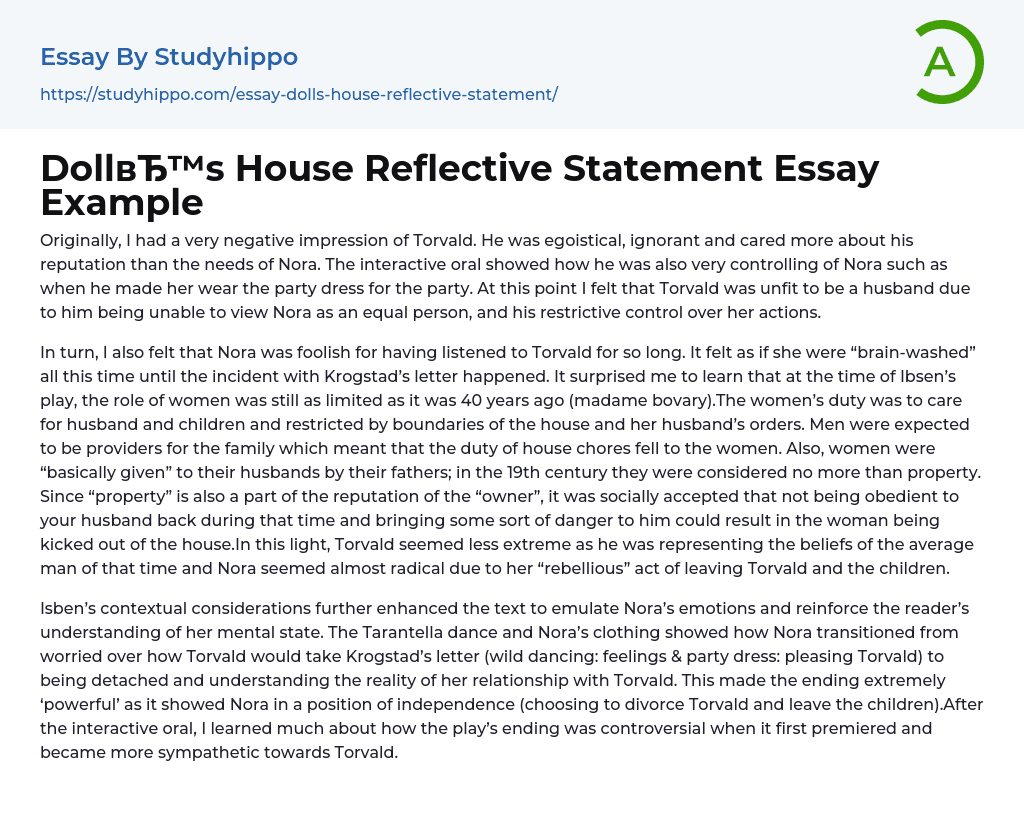Initially, I held a negative view of Torvald because he displayed egotism, ignorance, and prioritized his reputation over Nora's needs. The interactive oral session revealed his excessive control over Nora, as evident when he insisted she wear the party dress. I then concluded that Torvald was an unsuitable husband because he failed to see Nora as an equal and exerted restrictive dominance over her choices.
I also felt that Nora was foolish for listening to Torvald for so long. It seemed like she had been influenced or manipulated until the incident with Krogstad’s letter. It surprised me to discover that women's roles were still limited, similar to Emma Bovary's time 40 years ago. Their responsibilities included taking care of their husbands and children, and they were confined to the house and their husband's commands. Men were expected to provide for the fami
...ly, leaving the household chores to women. Additionally, women were essentially given away by their fathers and treated as property in the 19th century. Not obeying one's husband and posing a threat to him could lead to the woman being thrown out of the house, as she was considered part of her husband's reputation. Therefore, Torvald seemed less extreme as his beliefs reflected those of the average man during that time, while Nora appeared radical for her "rebellious" act of leaving Torvald and their children.
Isben’s contextual considerations helped to enhance the text in order to mirror Nora’s emotions and reinforce the reader’s comprehension of her mental state. The Tarantella dance and Nora’s attire depicted her transformation from being apprehensive about Torvald's reaction to Krogstad’s letter (expressed through wild dancing and wearing a party dress to
please Torvald) to becoming detached and comprehending the reality of her relationship with Torvald. This ultimately resulted in a powerful ending, where Nora displayed her independence by choosing to divorce Torvald and leave the children. Following the interactive oral, I attained a greater understanding of how the play's ending sparked controversy upon its initial premiere and grew more empathetic towards Torvald.
- Cleaning essays
- Child essays
- Child labor essays
- Childcare essays
- Adaptation essays
- Adventure essays
- Adversity essays
- Aging essays
- Alcohol essays
- Barbie Doll essays
- Beauty essays
- Care essays
- Carpe diem essays
- Change essays
- Chess essays
- Chicken essays
- Choices essays
- Contrast essays
- Crops essays
- Development essays
- Dream essays
- Evil essays
- Experience essays
- Family essays
- Farm essays
- Fire essays
- First Love essays
- Focus essays
- Greed essays
- Hero essays
- Holiday essays
- House essays
- Housing essays
- Humility essays
- Humor essays
- Hypocrisy essays
- Integrity essays
- Law of Life essays
- Life Changing Experience essays
- Life Experience essays
- Lifestyle essays
- Limitations essays
- Love Story essays
- Mother Tongue essays
- Motherhood essays
- My Neighborhood essays
- Myself essays
- Mystery essays
- Narcissism essays
- Never Give Up essays




